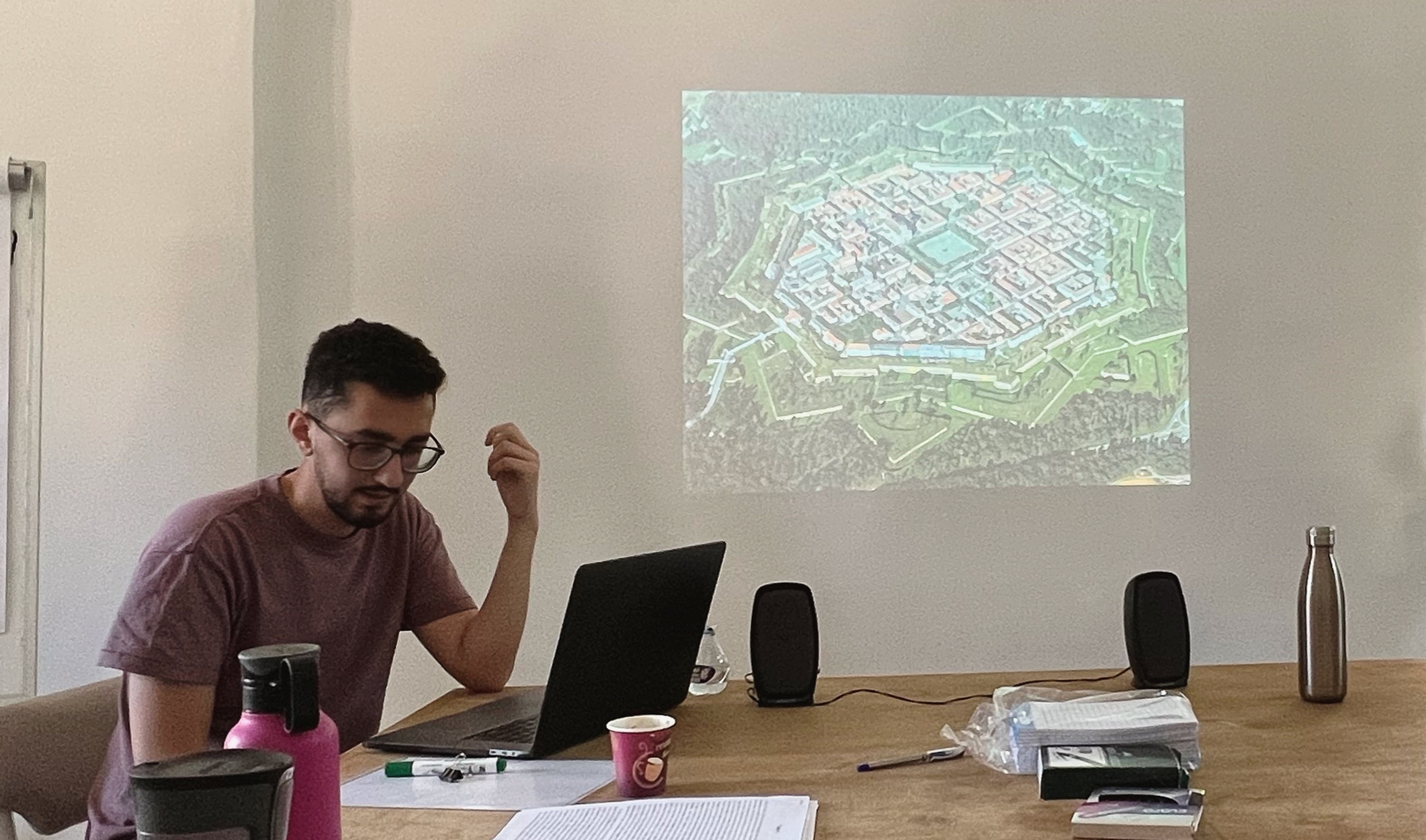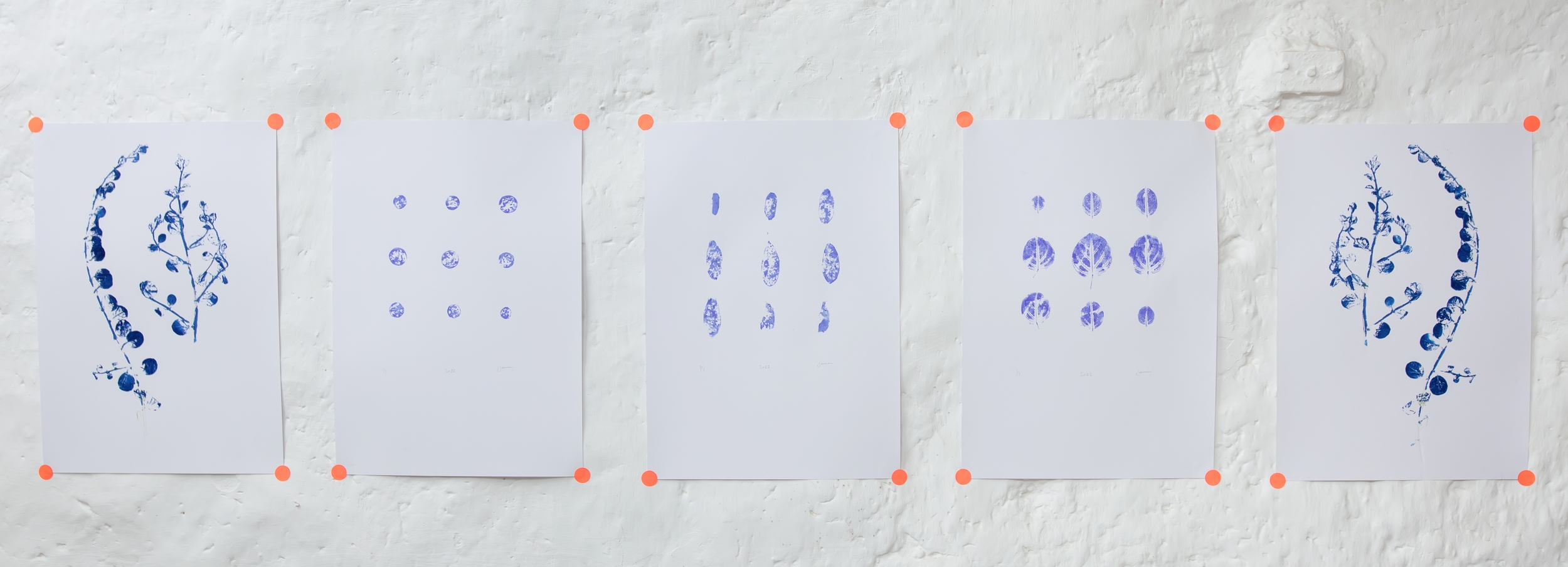Body
Interrogating Earth: Darat al Funun Summer Academy 2022
Through a combination of theoretical learning modules, excursions for field research, and acts of rapid publishing, seven participants examined how modern tools of material collection (archival material, citizen journalism, photography, video, or oral histories) can stand as fragments of evidence in addressing the complicated issues of our time.
Programmed on the margins of Re–rooting, the 2022 Darat al Funun Summer Academy, titled “Interrogating Earth” draws upon some of the methodologies and investigations presented in the exhibition and reveals the depth of the economic, urban, material, and political systems affecting our shared geography.
Over the span of four weeks, the Academy invited seven creative practitioners to engage with the exhibition’s main topics—water, food, agro-ecology, and extractive building practices—within a critical setting that encouraged experimentation, knowledge-sharing, and communal learning.
Taking inspiration from the methodologies and modes of inquiry presented in the exhibition, the program delved into an expanded view of archives, using the notion of “earth memory” as a starting point. The program unfolded over four modules—the city, the archive, archaeology, and the soil—considered repositories of information and knowledge that can be ‘mined’ to uncover alternate narratives that inform how we live, consume, and build collectively.


Darat al Funun Summer Academy 2022 session led by Khaled Al-Bashir.
01: ON CITIES AND FICTION
Facilitated by Khalid Al-Bashir and Zikra for Popular Learning
In reading the city as a repository for ‘earth memory’, we understand that cities are formed around events, and that events are formed around fictions.
The city is a novel. Who is the narrator? What is the setting? What are the events? Who are the contributors and who are the owners? How can we read the city as an act of publishing, and understand our role as publishers?

Excursion to the wheat harvest with Zikra for Popular Learning.

Guest talk by Deema Assaf.
02: ON ARCHIVES AND EARTH MEMORY
Facilitated by Foundland Collective and Deema Assaf from TAYYŪN Research Studio.
The Earth contains the largest natural archive. But it is an archive with no permanence. Efforts to create archives are always tainted with colonial perspective and imbalances of power. Those who own the knowledge own the narrative.

Excursions to Dibeen Forest Reserve with Deema Assaf from TAYYŪN Research Studio.

Visit to the Royal Botanical Gardens with Deema Assaf from TAYYŪN Research Studio.


Seed bank at the Royal Botanical Gardens.

Excursion to the Royal Botanical Gardens, overlooking the King Talal Dam.

Excursion to Wadi Feynan in the Dana Biosphere to visit sites of early human settlement and the copper mines.
03: ON ARCHAEOLOGY AND SPECULATION
Facilitated by Design Earth and Dr. Mohammad Najjar.
Wadi Feynan contains sites of the earliest human settlement; the first humans who opted for a sedentary life and to tame the land for agriculture settled in this arid, yet copper-rich, geography.
Today, Wadi Feynan, which is part of the Dana Biosphere, is a post-industrial landscape, polluted by excessive cycles of copper extraction and mining.
The landscape offers traces of human destruction and the Earth’s resistance and regeneration. We pick up fragments and try to piece together speculative pasts and futures.
What do these repositories of memory reveal? What narratives, stories, and systems can be uncovered? What can archives verify or deny in the era of post-truth?
Through a combination of theoretical learning modules, excursions for field research, and acts of rapid publishing, participants examined how modern tools of material collection (archival material, citizen journalism, photography, video, or oral histories) can stand as fragments of evidence in addressing the complicated issues of our time.

The Feynan Ecolodge.

Copper found in Wadi Feynan.


04: ON SOIL
Facilitated by A growing culture and Carob Farms
We come to understand that the global food system is unsustainable. Liberation comes in the form of reclaiming our lands and reinventing the way we eat and understand food and soil.
00: ACTS OF RAPID PUBLISHING
Facilitated by Rana Beiruti
In response to the urgency of addressing the environmental concerns of today, the module on rapid publishing exercised a delicate choreography between collecting and rapid dissemination, highlighting the ethical challenges that come with rapid publishing.
Rapid publishing can be messy—it can be inaccurate, regurgitating, and a violent contributor to the content pollution and content- fatigue of the 21st century. On the other hand, it is a valuable process through which one can tackle the urgency of the ecological message and the need to preserve, collect, disseminate, and act on the knowledge we come across.
To publish is to make public or disseminate fiction or nonfiction. This comes in multiple forms as image-making, writing, typing, performing, producing objects, planting forests, or making an exhibition. Carrying the spirit of rapid publishing, this publication includes collectively written sentences featured on the margins, annotating reflections, questions, and insights that emerged throughout the four modules of the program and at its culmination.
EXHIBITION AND OPEN STUDIOS: A COLLECTIVE BUILDING / BUILDING A COLLECTIVE
An exhibition of developed works took place in July 2022, with its name taking inspiration from a traditional practice act of communal building (known as building a A’ouneh)–a social building practice that bypasses blueprints and roadmaps or other representational tools as forms of staging an imaginary before forging it into a reality. Instead, this form of communing relies on sharing understanding, intuition, and trust spontaneously rather than on absolute and practiced truths.

A collective building / Building a collective. Exhibition and open studios of the Summer Academy 2022.
“Seven participants, a city imagined on seven hills and her surroundings, one month of working collaboratively and separately towards imagining, re/presenting, perhaps capturing what could be known as earth memory: fictional and real, preserved and lost, speculative and documented, as it manifests in the city, the archive, archaeology, and the earth itself."
Who re-members, and why? Is earth memory traceable in and for separately existing individuals or simply in the interaction of a collective created through that interaction? Could acts of rapid publishing – such as image-making, writing, typing, performing, producing objects, planting forests, harvesting seeds, and listening—bridge between the two? Earth memory is an archive embedded in our bodies as well as the landscapes surrounding and shaping us and to which we turn our attention in a shifting world, urgently attempting to shape them as much as they shape us. Earth memory, individual and collective as co-constitutive?”
— Collective text written by Summer Academy participants


Tasneem Zraikat — My Father’s Childhood Home, 2022.



Hanna Al Taher and Sarah Risheq — a body dreams of liberation, 2022.



Sara Sukhun — Untitled, 2022.



Sama Shahrouri — Caper around me, 2022.

